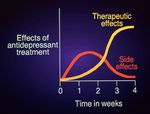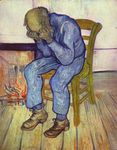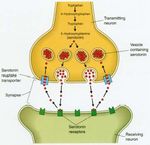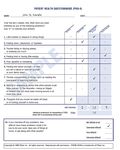Psychopharmacology for Collaborative Care Managers - Mi-CCSI
←
→
Page content transcription
If your browser does not render page correctly, please read the page content below
Keep a Perspective • Treating patients with depression and anxiety • Three main tools – Biology – which may mean a psychiatric med. – Psychology – therapy of various kinds – Patient behavior and self management • Which of these is more effective? • Which is easier for the patient to do? • The goal is to return a patient to functioning and normal emotional range – use all the tools
Scenario • Dr. Kim brings a patient to you and says, “Mr. M. here is an 70 yo man with hypertension and coronary artery disease. He recently moved to an assisted care facility; his family says he isn’t like himself anymore as he doesn’t want to do anything. • They think he’s depressed. Could you ask your psychiatrist if we should start an antidepressant? • What more information is needed?
Does the patient have an indicated
condition to use an antidepressant?
• Clinical history
– Does the chief complaint and history suggest a primary
depressive or anxiety disorder according to DSM5 criteria?
– Is there evidence that might suggest another reason for the
way the patient is presenting?
• Symptom measures – like your blood pressure measure.
A high level = look closer, not diagnose hypertension.
• Depression
– PHQ-9 ≥ 10
• Anxiety
– GAD7 ≥ 10Depression
• Common
– Lifetime prevalence of 16% (>20% in women)
– 10-20 percent of primary care patients are
depressed.
• Dangerous
– Depression history = 2 X risk of CAD
– Increases risk of HTN and stroke by 50%
– Depression post MI = 6 X risk of death in 18 mos*
» Frasure-Smith N, Lesperance F, Talajic M. Depression and 18-month prognosis after miocardial
infarction Circulation 1995; 15;91;999-1005.Screening , Monitoring
Tool - PHQ-9
• Quick, many languages
• First 2 questions must
have a positive score
• Score ≥ 10
• For Major Depression
• Sensitivity 88%
• Specificity 88%
• Mild (5),mod (10), mod severe
(15) severe depression (20)
*Patient Health Questionnaire (PHQ-9). Spitzer et al. Copyright Pfizer Inc. 1999
CP965332-13Could be something else…
– Bereavement – feelings tied to loss
– Thyroid disease – weight changes, energy changes
– Cancer – weight and energy changes, pain
– Substance induced mood disorder – tied to use patterns
– Bipolar disorder – rapid improvement, mania/hypomania
(earlier onset (mean age 24)
– Attention deficit – concentration and irritability more than
sadness or loss of interest
– Dementia – lack of interest or initiative
– Pain disorders – related to opiate use
– Persistent Depressive disorder – last 2 years or more with no
breakCould be Major depression plus…
• Among patients diagnosed with Major Depression
– Anxiety (75% w features, 37% w diagnosis lifetime prev.)
– Bipolar features (mixed features in 16%)
– Personality Disorder (32% w diagnosis)
– Substance abuse (58% w diagnosis)
• Insomnia/sleep apnea
• Pain, Thyroid disorder
• Social determinant – abuse, housing, finances, etc.
Hasin et al. Jama Psychiatry 2018Information to gather as we decide on
a medication
• Medical
– Hypothyroid, pain, sleep issues, evidence of cognitive
decline, fall risk, pregnancy, other medications…
• Psychological/Social
– Pattern – when did this start? What was going on?
– Drinking or drug use?
– Life stressors and timing of mood changes
– Past history of depression – what happened?
• Past medication trials – dose, duration, response?
– Other mental health problems
– Current life stressors, level of functionin and supportsComorbid anxiety? GAD7 • GAD should not be diagnosed when only occurring with a mood disorder or better explained by other anxiety disorder • Other symptoms of GAD: muscle tension, fatigue, insomnia, poor concentration • Several types of anxiety - panic, OCD, social anxiety, PTSD
How does the data gathering impact
the decision?
• Examples:
– If no history of mood problems and symptoms came
up after a sad event
• Might want to work on coping first
– If also has pain
• Might look at an antidepressant that also helps pain
– If on a drug that could cause drug interactions
• Think about that drug when choosing a med
– Failed responding to several antidepressants
• Is there a pattern? Maybe try a different class?Evaluation for Antidepressant (or Anti-anxiety) Medication
Is there a reason not to use an
antidepressant (contraindication)?
Only in rare cases are SSRIs absolutely contraindicated
Does the patient have?:
• Depression/anxiety secondary to another condition
– We address that condition and check back
– Substance use disorders are not contraindications to antidepressant treatment
• Bipolar disorder
– Antidepressants can lead to mood swings and/or mania if bipolar is the real issue
– May still be effective for comorbid anxiety disorder
• Medical condition or medications that would interact with
antidepressant treatment
• We also may find patients who have had bad reactions to
antidepressantsMechanisms of Psychopharmacology
Neurotransmission
Psychotropic Sites of Action
Increase release
Decrease reuptake
Decrease breakdown
Direct receptor activation
Receptor modulation
Direct receptor blockadeThings to think about with medications • Half life – how long does it take for half of the medicine to leave my body – Impacts how long to feel a benefit – Impacts how likely we will see withdrawal • Does the medication impact the cytochrome p450 system? – Enzymes that help break down medications – Basis for drug interactions • Can the medication do more than one thing? – Sleep and mood for example • Is this medication covered by insurance?
Makes my head spin, what do I tell
patients?
• Antidepressants aim to address the chemicals we all
have in our brain to return you to normal mood
– Not to make you into someone else.
– They are NOT addictive
• The initial effects on your body from the medicine
are to increase those chemicals
– So you may see side effects at the start
• The benefit comes from your body adjusting to that
increase
– So we need to stay on the medicine to reach benefitHow long to wait?
• Get to a minimal therapeutic dose
– Good sign if seeing some improvement in 2 weeks
– Leveling off of benefit in 6-8 weeks
• Good to have a list of the medications and the
dose ranges
– What is the minimal effective dose of each
medicine?
– What is the usual maximum dose?Neurotransmitters: Monoamines
Serotonin: CALM – Reduce strong negative emotions
mood, anxiety, sleep, anger/aggression
sexual functioning, gastrointestinal functioning
Norepinephrine: Can help with focus and pain
mood, anxiety
heart rate, blood pressure, “fight or flight”
Dopamine: enhancing versus blocking
motivation, mood, psychosis, attention, cognition, reward
motor activity, inhibits lactation
Histamine & Melatonin: sleepNeurotransmitters: Other
GABA: Think of the Valium drugs here as well as gabapentin
major inhibitory role, anxiety
sedation, cognition
Glutamate: This is a work in progress but think ketamine
major excitatory role, cognition, mood
psychosis
Acetylcholine: blocking versus enhancing
cognition and memory
heart rate, bladder, gastrointestinal: “rest & digest”
“anticholinergic” side effectsHow to use this information Explaining it to clients: • Example: “This medication affects the level of a chemical called serotonin in the brain” Helps to understand what are expected side effects Establishes classes of medications (e.g. SSRIs or SNRIs) • Easier to remember than learning each individually Helps understand new medications • Really new or “me too”?
Antidepressant Medications
Old-school Antidepressants
• Monoamine Oxidase Inhibitors (MAOIs)
– Require strict dietary restrictions to avoid dangerous side
effects, rarely used anymore
• Tricyclic antidepressants (TCAs)
– Significant anticholinergic side effects
– Dangerous in overdose (cardiac arrhythmias)
– Still used for migraine headaches, nerve pain, sleep
• Amitriptyline (Elavil), Nortriptyline (Pamelor), Doxepin (Sinequan)
– Generally not first choice for depression/anxiety
– Often see low dose at night added to another
antidepressant but watch for drug interactionsMore commonly used
Antidepressants
• SSRIs – serotonin recycling blocker
• SNRIs – impacts serotonin AND norepinephrine
• Bupropion (Wellbutrin) – serotonin not involved –
impacts norepinephrine and dopamine
• Mirtazapine (Remeron)
• Trazodone – also serotonin in another way but is
so sedating that used mostly for sleep
• OthersSSRIs • Fluoxetine (Prozac) • Sertraline (Zoloft) • Paroxetine (Paxil) • Citalopram (Celexa) & Escitalopram (Lexapro) • Fluvoxamine (Luvox) • FDA approved for major depressive disorder • This group is often picked when also having anxiety • Some also approved for: – Posttraumatic stress disorder – Generalized anxiety disorder – Obsessive compulsive disorder – Social anxiety disorder
SSRIs: Common Side Effects • Gastrointestinal upset (nausea, diarrhea), usually transient over the first few days • Sexual side effects – difficulty with libido, erection, orgasm, reversible upon stopping medication • “Early activation” – transient period of increased anxiety, restlessness upon initiating treatment • Discontinuation syndrome – “Brain zaps”, electric shock-like sensations in the neck and head • Insomnia or somnolence • Weight gain, average about 1% per year
SSRIs & Serotonin Syndrome • Serotonin Syndrome: uncommon but dangerous consequence of excessive serotonin activity – Symptoms: muscle rigidity, fever, agitation • Causes: overdose of SSRI antidepressants or combination of medications that affect serotonin • Other pro-serotonin drugs include: – Tramadol and other opiates – Triptans for migraine headaches – Stimulants and drugs of abuse: cocaine, ecstasy (MDMA) – Anti-nausea medications, some antibiotics – St. John’s Wort, some herbal supplements
SSRIs: Differences within class • Citalopram, escitalopram, and sertraline have the fewest interactions with other medications – Good for older patients on lots of medications • Fluoxetine has the longest half-life – Possible better for patients apt to miss doses – Also most weight neutral • Paroxetine may have greater anticholinergic side effects and worse discontinuation syndrome – Also more concerns in pregnancy
SNRIs • Venlafaxine (Effexor) & Desvenlafaxine (Pristiq) • Duloxetine (Cymbalta) • Levomilnacipran (Fetzima) – rarely used until generic • Block reuptake of serotonin and norepinephrine • Efficacy and side effects generally similar to SSRIs • Advantage vs. SSRIs: also effective for neuropathic pain (e.g. from diabetes, fibromyalgia) • Disadvantage vs. SSRIs: greater hypertensive effects
Bupropion (Wellbutrin) • Mechanism: Inhibits norepinephrine and dopamine reuptake • Effective for major depression and smoking cessation • Common side effects: headache, insomnia • Advantages vs. SSRIs: Less weight gain or sexual dysfunction • Disadvantage vs. SSRIs: not effective for anxiety disorders • Avoid in patient with a seizure history
Mirtazapine (Remeron) • Complex mechanism: blocks some serotonin receptors while increasing serotonin and norepinephrine release • Effective for major depression • Common side effects: sedation and weight gain • Advantage vs. SSRIs: useful if insomnia and weight loss are present, less sexual side effects • Disadvantage vs. SSRIs: weight gain, not proven effective for comorbid anxiety disorders
SRI plus Serotonin Modulator • Vilazodone (Viibryd) – (2011) Vortioxetine (Trintellix) – (2013) • Serotonin reuptake inhibitor and partial serotonin receptor activator • Might not be covered by insurance • Vilazodone may have less sexual side effects • Vortioxetine may help with cognitive issues in depression • No clear reason to expect these are better by being new.
Trazodone • Weak serotonin reuptake inhibitor, blocks and partially activates some serotonin receptors • Used most often for its primary side effect in low doses: sleep • Rare side effect: priapism (erection that won’t go away) • Other common side effect: hangover
Choice of Antidepressant
• 38 year-old woman with depression and anxiety
A) Sertraline
B) Venlafaxine
C) Bupropion
D) Mirtazapine
• What if she also has ADHD symptoms but no anxiety?
• What if she also has chronic neuropathic pain?
• Remember, the patient has to keep taking the med (50% stop)
• There is no best antidepressant – choice is based on side effects,
preferences, cost, comorbidities
– Mayo antidepressant shared decision aid for a first medication choice
– https://depressiondecisionaid.mayoclinic.org/indexWhat if initial treatment fails?
• Up to 2/3rds of patients fail initial treatment
• Options for the next step include:
– Increasing dose
– Adding a second “augmenting” antidepressant from other class
• SSRI + bupropion or mirtazapine are common choices
– Switching to another antidepressant (< 60% improvement)
• SSRI to other SSRI is as good as switching to bupropion
– Augmenting with an antipsychotic or other medication
• VA trial found augmentation with aripiprazole (Abilify) was more effective
than switch to bupropion.
• After 2 failures, scrutinize diagnosis, consider intensifying
treatmentOther Common Psychotropic
MedicationsBenzodiazepines
• Alprazolam (Xanax)
• Clonazepam (Klonopin)
• Lorazepam (Ativan)
• Diazepam (Valium)
• Mechanism: act on GABA receptors to enhance GABA effects
• Indicated for panic disorder, generalized anxiety disorder
– Also used to treat alcohol withdrawal
• Best if used short-term (in primary care)
• Not effective for depression or PTSD
• Potential for abuse and dependence
• Caution with driving, not to be mixed with alcohol
• Sudden withdrawal syndrome: anxiety, shakes, insomnia, seizures
• Can worsen cognition in elderly and may increase fall riskControlled Substance Prescribing
Benzo use doubles risk of opiate overdose
• MAPS report required prior to prescribing
• Only 30-day supply at a time (+/- refills)
• Consider also:
– Urine drug screen for other substance use
– Patient contract
• Only one doctor at a time
• No early refills or replacement for lost medications
• Attend all appointmentsOther (non-addictive) anti-anxiety • Buspirone (Buspar) – indication is GAD – Serotonin agonist, not effective for depression – but can augment – Takes weeks to work, significant GI side effects • Hydroxyzine (Atarax, Vistaril) – Anti-histamine (like Benadryl), can be taken PRN, works immediately – Avoid in elderly (confusion, falls). Can impact EKG (QTc) • Gabapentin (Neurontin), Pregabalin (Lyrica) – also GABA system – Works immediately, safe – Good for alcohol withdrawal and related anxiety & neuropathic pain • Prazosin (Minipress) – Anti-hypertensive medication, increased dose gradually – Evidence primarily for PTSD-related nightmares – Effectiveness has been questioned recently
“Z” Drugs -- Hypnotics • Zolpidem (Ambien) • Eszopiclone (Lunesta) • Zaleplon (Sonata) • Act at same GABA site as benzodiazepines • Care when combining with other sedating medications (e.g., opiates, benzos) • Typically want to use for short term if possible • Higher doses (above max range) can be addictive • Have been associated with rare disordered behaviors during sleep (e.g., sleep walking)
Other Hypnotics (“Sleep Aids”) CBT for Insomnia recommended 1st line for chronic insomnia • Diphenhydramine (Benadryl, other OTCs) – Stops working quickly, anticholinergic side effects • Melatonin – Generally safe, not very effective long term • Sedating antidepressants: Doxepin, Trazodone, Mirtazapine • Ramelteon (Rozerem): melatonin agonist – Limited effectiveness • Belsomra (suvorexant): (2015) – Orexin antagonist
Talking with Patients about
AntidepressantsThe nuts and bolts • Antidepressants need to be taken daily, NOT as needed • All antidepressant take 2-4 weeks to see a benefit • Most side effects resolve in a few days, serious side effects are rare • Antidepressant should be continued for at least 6 months. Longer if recurrent serious episodes • If the first antidepressant doesn’t work out, there are many other options – generally 60% rule (change/add)
Antidepressant FAQ
Q: Are antidepressants just a placebo?
A: Antidepressants trials consistently show
superiority to placebo: about 30% will get better
with a placebo compared to 40% with an
antidepressant
– Placebo response is high with depression, some
consider this part of antidepressant treatmentAntidepressant FAQ Q: Do antidepressants cause suicide? A: Although the FDA warns against an increase in suicidal thoughts and behaviors in those under 24 years old, there is no convincing evidence antidepressants result in an increase in suicide death. Epidemiologic studies suggest antidepressant use is associated with fewer suicides
Antidepressant FAQ Q: Are antidepressants addictive? A: Antidepressants are very rarely abused (no real street value) and have no dangerous withdrawal syndromes. Withdrawal occurs in some patients with short acting drugs – more uncomfortable than dangerous
Antidepressant FAQ Q: Do antidepressants turn people into zombies? A: Most antidepressants are not sedating nor cause problematic slowing of cognition. Some people report feeling overall less emotional on antidepressants. This may be a dose issue or a need to try another medicine. The goal is not lacking emotions but having normal range.
Antidepressant FAQ Q: Am I going to be on this medication forever? A: Recommend at least 6 months after achieving remission if first episode, indefinitely if multiple episodes. Message to patients is, “It’s up to you how long you take this medication, and whether you find the benefits outweigh the costs”
Conclusion Antidepressants are effective, generally safe, and preferred by many patients Keys are: 1. Rule out other causes of depression, including bipolar disorder and medical conditions 2. Provide education to patients about antidepressant treatment, expected response time, and side effects 3. Follow-up with patients to assess treatment response and to ensure changes are made when response is inadequate
Resources Related to Medications
ICSI
(Institute for Clinical Systems
Improvement), Depression, Adult in https://www.icsi.org/guideline/depression/
primary care depression
APA (American Psychiatric Association) https://psychiatryonline.org/guidelines
Practice Guidelines
American Geriatrics Society 2019 Updated https://onlinelibrary.wiley.com/doi/full/10.111
AGS Beers Criteria® for Potentially 1/jgs.15767
Inappropriate Medication Use in Older
Adults
Mayo antidepressant shared decision aid https://depressiondecisionaid.mayoclinic.org/i
ndex
Psychopharmacology and Psychiatry https://podcasts.apple.com/us/podcast/psycho
Updates Psychopharmacology Institute pharmacology-and-psychiatry-
(Podcasts) updates/id1425185370
(free access to short and preview podcasts)Case Follow-up
• You assess Mr. M. and the medical record documentation
• His PHQ9 is 18, loss of interest started 1 month ago after moving
• No history of mania, substance use, or trauma. No past depression.
• Medical history positive for a heart attack 10 years ago with bypass
surgery, has hypertension and high cholesterol, treated with medications
(beta blocker, ace inhibitor, statin, and aspirin)
• All lab work is normal
• Would starting an antidepressant at this point be appropriate?
• What might be further areas of focus in this patient prior to starting
antidepressant treatment?
– Cognitive functioning
– Recent change in medications, medical condition
– Problems related to environment, socializingQuestions?
You can also read






















































